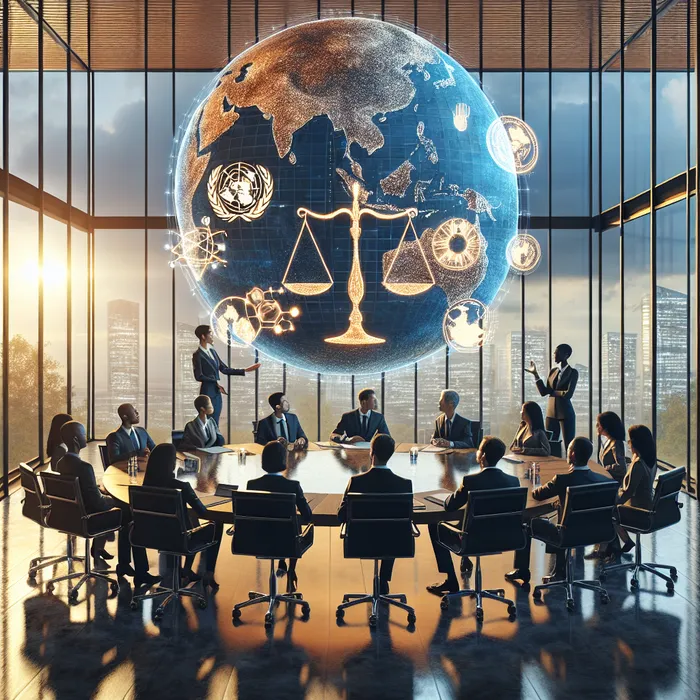South Africa Is No Longer Alone on the International Stage

Discover how South Africa's leadership in the Hague Group is forging a powerful transnational alliance to uphold international law and challenge Western impunity.
Image: IOL / Ron AI
South Africa’s position on the human catastrophe in Gaza has been consistent, lawful and morally serious. It has insisted that international law must be applied equally to all countries, regardless of their power or alliances. This has included the referral of Israel to the International Court of Justice (ICJ) on charges of genocide. While Pretoria has won international respect in many quarters, the price has been steep. It has come under immense pressure from the United States, in particular the Trump-aligned right, as well as from domestic organisations and figures closely aligned with the West.
In this context the formation of the Hague Group—a bloc of states committed to defending international law and ending impunity—marks a development of considerable significance. The group was convened by the Progressive International and launched on 31 January 2025. It is chaired by Colombia and South Africa, with current members also including Bolivia, Cuba, Honduras, Malaysia, Namibia, and Senegal. The coalition—spanning Latin America, Africa, Asia and the Caribbean—pledged to support ICJ and International Criminal Court (ICC) rulings, prevent arms transfers to Israel, bar military fuel shipments, and pursue legal accountability for violations in Gaza.
Western governments have long invoked the language of a ‘rules-based international order’—sometimes in strident moral terms—to justify their global domination. But this order has often served to shield the West and its allies from legal scrutiny while imposing strictures on others. The 2003 invasion of Iraq by the United States was a clear violation of international law. The NATO-led regime change intervention in Libya in 2011 was also unlawful. In Afghanistan, elements of the two-decade occupation—including targeted killings and drone strikes—breached international humanitarian law. Israel’s bombing campaigns in Syria and Yemen, sometimes backed or tacitly accepted by the West, included strikes on civilian infrastructure and violations of territorial sovereignty and have been deemed unlawful by UN experts and legal assessments. In each case, a supposedly rules-based order yielded to the impunity of powerful Western states.
Until now, the idea of international law as a universal normative system has been more aspiration than reality. The United States has not ratified the Rome Statute and has actively resisted ICC investigations, including imposing sanctions during the probe into alleged U.S. war crimes in Afghanistan. Israel remains outside the court’s jurisdiction. The ICJ—though central to the UN system—continues to be undermined: the U.S. withdrew from its compulsory jurisdiction in 1986 after being found to have violated international law in Nicaragua.
South Africa’s decision to bring the genocide case against Israel before the ICJ was bold and principled. Though the Court’s final ruling is pending, provisional measures have already instructed Israel to prevent genocidal acts and allow humanitarian aid.
That legal action made South Africa a target. In the US the Biden administration expressed concern, but pressure escalated dramatically when Donald Trump returned to the Presidency.This is one reason among many why the Hague Group matters. By aligning with other states in defence of international law, South Africa has built a collective bloc. This bloc’s cohesion offers protection as well as enhancing the aim of defending international law.
Francesca Albanese, the UN Special Rapporteur on the Occupied Palestinian Territories, argues that the Hague Group provides “a global push for collective action through international law—no arms for genocide, no aid for occupation, and no tolerance for apartheid.” In her view, the initiative not only exemplifies states meeting their legal obligations but also challenges the exceptionalism that shields powerful states from accountability. She has argued that the Group’s efforts “must become a global initiative” if the integrity of international law is to be affirmed.
The next milestone for the Group is the Emergency Conference co-hosted by South Africa and Colombia and set for 15–16 July 2025 in Bogotá. This gathering will include many non-member states—though not all are expected to formally join the Group—and focus on enforcing ICJ rulings, halting ongoing violations, and affirming Palestinian self-determination. Delegates are expected to announce coordinated legal and diplomatic measures.
South Africa’s response to the crisis in Palestine has helped restore some of the international moral standing lost during the Zuma years. At home, it has given some citizens hope that an ethical core still exists within the ANC and government, and could extend to other pressing issues at home and abroad.
Perhaps this is why the legal team were greeted at the airport with the kind of warmth and pride usually reserved for triumphant sports teams when they returned from the ICJ. It was a moment that revealed a deep public hunger for moral seriousness and national purpose. Tellingly, the approach to the ICJ won strong support from mass-based organisations such as the National Union of Metalworkers (NUMSA) and Abahlali baseMjondolo, which are usually intensely critical of the ANC.
In the West there is a clear shift, especially among young people, from uncritical support for Israel. Nonetheless, governments in countries like Germany and the United Kingdom, along with the US of course, continue to back Israel’s unlawful actions in Gaza, as well as Yemen, Syria, Lebanon and Iran.
In this context where support for change still confronts powerful opposition the Hague Group is a significant collective challenge to the impunity of powerful Western states. The era in which Western exceptionalism defined the limits of legal accountability is being directly contested. Whether this results in meaningful enforcement or another retreat into hypocrisy will depend not only on the Hague Group’s resolve, but on whether other states are prepared to act on the principles they claim to uphold.
* Dr Jagarnath sits on the council of the Progressive International.
** The views expressed do not necessarily reflect the views of IOL or Independent Media.